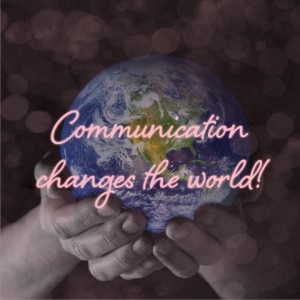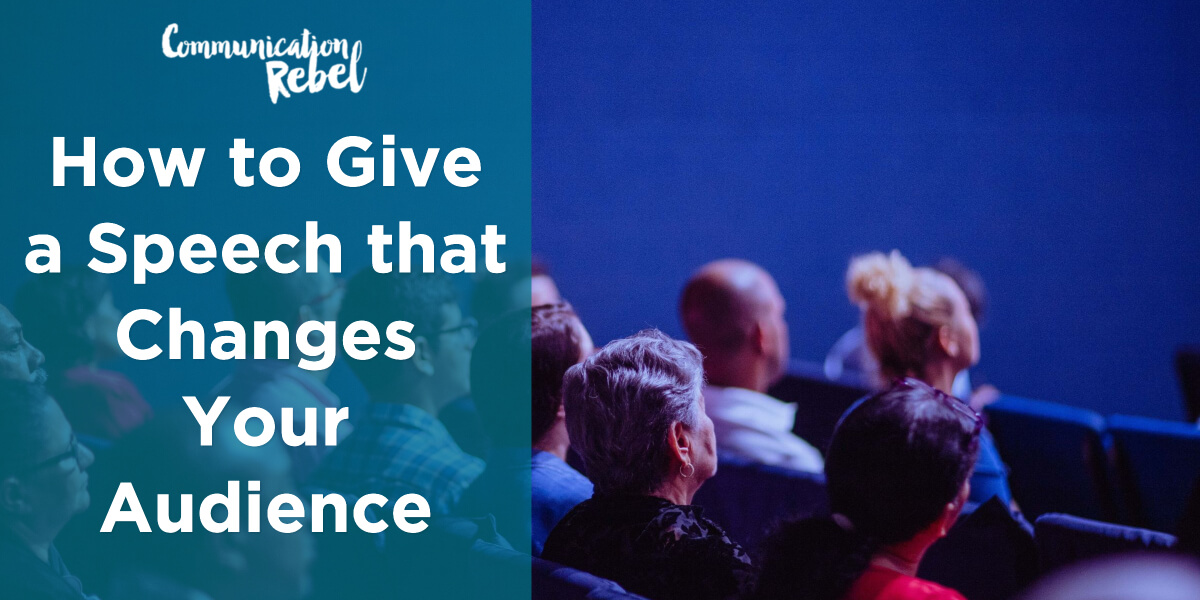How to Give a Speech that Changes Your Audience’s Perspective
 When people ask me how to give a speech, I often ask them why do they want to make that speech.
When people ask me how to give a speech, I often ask them why do they want to make that speech.
What's the purpose of it? What are they seeking to do?
I believe that:
Communication changes the world.
Nothing truly great has ever been done without the ability to speak about the transformation.
Opening your mouth, giving your ideas a voice, and spreading your message has untold power to revolutionize the world for good (or if this superpower is used for evil wreak havoc on everything).
The only reason ever to give a speech is NOT to sell, to promote yourself, to make yourself look incredibly awesome in front of a room full of people – it's to create change.
Seth Godin gets me! I feel like he read my blog (he didn't) or my book (no way that happened), but he believes that the only purpose of a presentation is to make a change happen.
A presentation that doesn't seek to make change is a waste of time and energy. ~Seth Godin
Approach every presentation you give – no matter if it is an intimate group of 5 or a rock star crowd of 50,00 – by asking 3 simple questions that bring about transformation.
1. What value am I creating for my audience?
Change only comes when value is created. Value means they learned something new about themselves or the world around them.
Usually, this value creates tension or a desire for change. Introducing that new information to them can be the catalyst for change.
Your presentation should leave your audience in a better place after they hear you speak.
2. What change do I seek for my audience?
This is about action. By listening to you speak, what can your audience do differently? What action can that take immediately after that benefits them (not you).
3. If I change my audience, how does that change me?
If you can change your audience, the audience wants to give back.
This is your opportunity. The change might mean to they want what you are selling. You become a trusted friend to the more they want to have you back to speak again. The bottom line when you speak to change others, you can't but help change yourself.
What change do you want to bring into the world during your next presentation? Share it in the comments below (the more you share your vision – the more likely it will come true).


Michelle — it’s funny. The last time I mentioned to someone this very principle — that the best and only reason to speak is to change the world, I got seriously laughed at. I guess some people are truly jaded by their experience, believing that we are no longer children who dream such “big” and lofty thoughts such as changing the world.
That’s fine. I like the idea of changing the world, even if I attempt to do that one life at a time. Thank you for sharing this gem.
It’s all about little change. If you change one person, they might make a change in 2 people. Then those people change 2 more people, it’s all about the ripple effect. I know I sound idealistic, but it’s really possible.
A thousand times YES to this.
I got into a heated discussion on a panel recently when someone suggested that the only way to measure success was by sales/money made – and I absolutely dropped the “change the world” line.
Money is a very limited definition of success. Frankly, I would NOT want to do business with anyone who just saw me as an “easy score” and didn’t want to make sure his/her product served me before raking in the dollars. I love money, but I also don’t let it be the sole factor of success!
I so agree Michelle. (That’s why I wrote this post.)
Yes Craig! Great post – I tried to comment, but wordpress was not letting me. Boo!
Outstanding piece, Michelle. I included it in my newsletter feature stories in the “Dreams to Action Weekly.” I have been bombarded by coaches who want to set up a business plan, a life skill plan, a spiritual plan, a health plan, etc. There seems to be a marketing trend these days that involve a slew of slick, inauthentic questions that I know very early on are going to lead to a sales pitch. Good speeches and good marketing invite change and authentic relationships. I am a professional speaker and writer. When I speak, I often show others how to plan and collaborate. I have tools, I have strategies, but I am a storyteller and my passion lies in building personal connections with listeners. If my focus is on selling my book, etc., I failed in my mission to create change and I’ve failed my audience. Absolutely spectacular piece. Thank you!
Hi Dr Julie! Thank you so much for including this in your newsletter. I’m honored and flattered!
There is a trend in speaking (especially those who do it for their business) is start with questions that gets a yes and then bombard the audience with information and make the pitch. People buy because of emotional connection because they feel like you have their back. It’s the know, like and trust factor.
Like you said, when the focus is on selling a book or signing up for a newsletter the connection is lost because the end goal is speaker focused and not audience focused.
Great work Michelle! When words come out of our mouth and are heard by an audience, it is like throwing a stone into a pond. The “ripple effect” you mentioned takes place and you never know where your influence stops. I often use the example of Socrates to make this point. He never wrote a word. Writing was a new invention during his time and he mistrusted it because he believed it would impair memory. He simply spoke. Of course one of his listeners was a kid named Plato who furiously wrote down every word. When Plato got older he had a kid following him around named Aristotle, and well, the rest is history (the birth of Philosophy actually). But it all started with Socrates simply talking to those who would listen. Yes our words CAN change the world!
[…] Whether you’re presenting at an event or giving a webinar or teleseminar – there’s one reason you’re there. To create change and to solve a problem for your people. […]